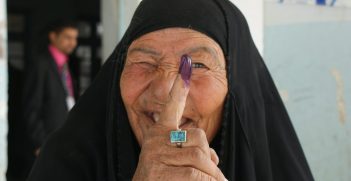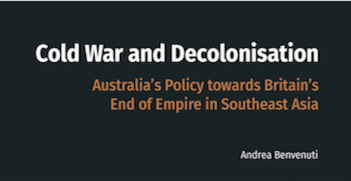Expert Panel-Fellows of the AIIA
|
 Hilary Charlesworth FAIIA-Professor, ANU; Director of Centre for International Governance and Justice Hilary Charlesworth FAIIA-Professor, ANU; Director of Centre for International Governance and Justice |
 Jocelyn Chey AM FAIIA-Visiting Professor, University of Sydney; former Consul-General in Hong Kong Jocelyn Chey AM FAIIA-Visiting Professor, University of Sydney; former Consul-General in Hong Kong |
 James Cotton FAIIA-Emeritus Professor at the University of NSW James Cotton FAIIA-Emeritus Professor at the University of NSW |
 Rawdon Dalrymple AO FAIIA-Former Visiting Professor, University of Sydney; Chairman of ASEAN Focus Group Ltd Rawdon Dalrymple AO FAIIA-Former Visiting Professor, University of Sydney; Chairman of ASEAN Focus Group Ltd |
 Graeme Dobell FAIIA-Journalist Fellow, Australian Strategic Policy Institute Graeme Dobell FAIIA-Journalist Fellow, Australian Strategic Policy Institute |
 Erika Feller FAIIA-Former UNHCR Assistant High Commissioner for Protection Erika Feller FAIIA-Former UNHCR Assistant High Commissioner for Protection |
 Janet Hunt FAIIA-Former Head of the Australian Council for Overseas Aid Janet Hunt FAIIA-Former Head of the Australian Council for Overseas Aid |
 James Ingram AO FAIIA-Former Diplomat and Head of the UN World Food Program James Ingram AO FAIIA-Former Diplomat and Head of the UN World Food Program |
 John McCarthy AO FAIIA-Former Ambassador to Japan, Indonesia, the United States, Thailand, Mexico and Vietnam John McCarthy AO FAIIA-Former Ambassador to Japan, Indonesia, the United States, Thailand, Mexico and Vietnam |
 Robert O’Neill FAIIA– Former Chichele Professor of the History of War, Oxford University Robert O’Neill FAIIA– Former Chichele Professor of the History of War, Oxford University |
 Garry Woodard FAIIA-Former Diplomat and Senior Fellow, University of Melbourne Garry Woodard FAIIA-Former Diplomat and Senior Fellow, University of Melbourne |
 Richard Woolcott FAIIA-Former Secretary of the Department of Foreign Affairs and Trade Richard Woolcott FAIIA-Former Secretary of the Department of Foreign Affairs and Trade |
Question: Should Australia Deploy Troops to Iraq?

Robert O’Neill FAIIA |
Iraq is still a very long way from peace. The size and nature of the conflict which is building there and in Syria suggests that we should be employing political, social and economic means to help local governments and religious groups to settle their differences. The local people have to do it – we cannot force a solution on the region with military means. Military intervention on the scale proposed is likely to undercut other efforts without achieving a lasting result. So it would be better not to send forces now; let us not forget that the lives of the men and women that we send are on the line in such a deployment. We should be very careful about balancing the risks they have to run in the line of duty with the worth of the goals that a forced deployment might achieve.My answer to the question therefore is “no”. Let us take a less military and more political approach to the problems of the Middle East. |

John McCarthy AO FAIIA |
Australia should send troops only on a responsibility to protect basis with clear exit strategy. In practice, the latter will be difficult to achieve as have been all such exercises. However balance of arguments favours Australian involvement in R2P coalition.
If you accept R2P, it matters little whether intervention is air only or ground forces.(In any event, I fail to understand why Special Air Service are not categorised as ground forces).
I do not accept the argument that the Islamic State (IS) is a sufficiently direct threat to Australia to warrant intervention on basis of security argument despite horrific nature of ISIL crimes. (Such things have unhappily occurred in most wars and more specifically under Saddam and the Assads, in Afghanistan and in Iraq post-US invasion)
I do not accept the argument that the risk of Australian jihadists returning home warrants Australian intervention. This is a matter for internal security. It also requires extensive community work.
So, my answer is a reluctant “yes”. My sense. however, is that the Australian community is not being persuaded by R2P argument but by a (justifiable) sense of outrage; by Australia’s historical need to “be in it” and by political rhetoric. Some may also see it in terms of alliance dues .
|

Richard Woolcott FAIIA |
No. (Don’t we ever learn from our mistakes?)
bjhjklljbhkhujkjhgijkljhuiolkjhhuiokljhuiouljkjguilkojlkgu;jbgkuhiojkiljmjkhlkjjhijkl;njkjlknkjl;mkjlkml |

Jocelyn Chey AM FAIIA |
I believe we should not be deploying troops to Iraq for many reasons, of which outstanding are:
1. There is no UN agreement on this campaign
2. Our Defence policy is to concentrate on regional issues
3. No clear goals or outcomes have been defined so that the campaign, as the PM has admitted, may well drag on for years
4. Civilian casualties are likely to be high
5. Australia’s security threat will be increased
6. The drain on our budget is hard to justify when the public is told that there is a national emergency and social services are being cut.
|

Rawdon Dalrymple AO FAIIA |
Now that the US President has asked us to participate, no Australian government would want to say no. But the Australian government encouraged the invitation and I think that was unwise. This situation created by the sudden success of ISIL won’t be resolved by foreign non-Islamic states or their forces. Already there are reports of a similar organization being established by Shia fighters with the same sort of ethos. This could go on for years. And in the meantime, the bombing by US, Australian and potentially some European forces will cause resentment, real or confected, beyond the targeted groups. |

Garry Woodard FAIIA |
Pace Zhou Enlai, ‘It is too early to say’.The more relevant question is whether there can be open debate on the deployment, and periodically, as both major parties’ positions on this seem to be negative to an unprecedented degree. |

James Cotton FAIIA |
Lethal force should never be employed except in defence of national interests. When the deployment in question is in a distant theatre, the compelling case for the protection and promotion of those interests using this means should be absolutely clear.The case for the current Middle Eastern deployment is far from clear. If it is argued that ISIL is a rogue movement that must be checked, its activities have generated far fewer fatalities than have been the consequence of the Syrian regime’s campaign of internal repression, where its opponents have included ISIL. Arguably, beheading however reprehensible is no more barbaric than the use of chemical weapons against civilian populations. Here the prime minister’s earlier characterisation of the Syrian conflict as ‘bad guys vs bad guys’, though inelegant is reasonably accurate. A vital Australian interest is not therefore at issue.The point arises that as, in practice, 600 Australian troops would make no discernible military contribution to any outcome, the real reason for the deployment is in order to demonstrate support for a US-led coalition. However it should be recalled that the current instability in the region is a direct consequence of the actions of a previous US-led intervention – in which Australia played a minor but enthusiastic role – the management of which was a disaster by any standard. As the prime minister himself has said, ‘If you look at the full-scale intervention in Iraq in 2003, we are at the present pass.’ The reputation of the US in the region is consequently very poor, with a good many of its inhabitants convinced that their troubles stem from the 2003 intervention. The likelihood of securing cooperation from those inhabitants in an operation in which Washington is the major player is thus not great.
The coalition that might make a difference in the ISIL case is one to be negotiated between Ankara, Cairo, Riyadh and Baghdad. ISIL is certainly a danger to the interests of these states and regimes. If such a coalition cannot be assembled – our foreign minister would be well-served by a visit to all of these players to hear their views first-hand – then no external coalition is likely to provide a substitute. Meanwhile, arming the Kurds might just succeed in offending those very states whose influence must be brought to bear for there to be any prospect of a resolution of the ISIL problem.
It should also be kept in mind that until the Iraqi political system is placed on a broader basis – itself a tall order – the region lacks a vital element for a road map that would lead to a more settled future. The status and character of the newly formed government in Iraq have been talked up by members of the intervention coalition but, apart from the fact that many of the same personnel are to be found in its ranks who were in power previously, there can be very little ground for claiming now that its performance will be much better than its predecessor. It is quite appropriate to be hopeful of its chances, but interventions on the basis of hope are rarely successful.In defence of the deployment, the Prime Minister has said, ‘What we’re trying to do is to help the people of Iraq to help themselves, so that people based in their country will no longer threaten us, as is currently the case.’ It follows that if any national interest is at stake in the ISIL case it is not in regard to the humanitarian crisis facing civilians in parts of Northern Iraq, worrying though that issue might be, but rather it is in relation to the radicalisation of Australian residents as a result of experience, vicarious or actual, of the current conflict. Now it is a moot point whether direct military involvement in that theatre will enhance or undermine that radicalisation. If the government’s case in relation to this question is compelling, it needs to be debated in advance of any deployment. And part of that explanation needs to address the grounds on which the government evidently believes that backing away from a clear commitment to a two-state solution in Palestine/Israel is irrelevant to that radicalisation. |

James Ingram FAIIA |
In an unseemly way our government has been the first to offer concrete material support to the projected US operation against IS. Even if the government had made a serious case for its actions it would have been inappropriate for a distant nation, with limited interests in the region and very marginal capacity to influence outcomes, to take the lead and practically beg for a formal US request. Speculation as to what motivated the Prime Minister may be left to the commentariat but his aggressive, inappropriate posturing vis-a-vis President Putin, his extravagant language about IS evil accompanied by an inability to concede that our intervention must increase the risk of a terrorist attack directed against Australia while at the same time raising the ‘threat level’ gives weight to the suspicion that the government is seeking to distract attention from its unpopularity over domestic matters. During a centenary year in which Australian military heroism is being glorified and the ‘boats have been turned back’ it would not be surprising if the image of a ‘strong’ leader totally committed to the nation’s security carries a subliminal appeal to a great many voters.President Obama would clearly have preferred not to become a party again to war in the Middle East. As many analysts have pointed out, his supposed strategy is nothing of the sort but a reaction to domestic political pressures brought to a head by IS’s bloody killing of two Americans. The US must have realised for some time that IS was attempting nothing less than destruction of the state system put in place by Britain and France following the Ottoman Empire’s collapse. That the President temporised perhaps reflected his appreciation that any American intervention might make matters worse as virtually every Anglo-American action in the region since 1945 has done at the cost overall of extraordinary human suffering and much treasure. While the Arab states and the Kurds may all agree that they don’t want a viable Islamic State carved out of Syria and Iraq they are most unlikely to be able to agree on what they do want. Turkey, Iraq and Syria’s key neighbour, abhors the possibility of the Kurds becoming a state, has in practice helped the emergence of IS and has not committed to support American policy. Saudi Arabia and others have helped IS financially and in other ways. The Sunni minority benefitted from Saddam Hussein’s rule and the Shia majority was oppressed. The Shia will not risk that situation returning. The wholehearted cooperation of these many players may get lip service but probably not a great deal more. Factors such as these and others account for America’s earlier, sensible low-key approach. Now it is attempting somehow to balance the conflicting forces dividing a deeply troubled region in a concerted effort to destroy IS. We can wish them well but should not have involved ourselves. |
[really_simple_share]
Past Questions
September 9, 2014
Should Australia have Closer Relations with NATO?
July 25, 2014
Are Expectations of Australia’s International Influence Unrealistic?
July 1, 2014
Is Australia Powerless to Help its Citizens Abroad?
June 23, 2014
What are Australia’s Responsibilities in Iraq?
June 10, 2014
Is China Destabilising Asia?
May 9, 2014
Is the US a Dangerous Ally for Australia?
April 28, 2014
Did you find Bob Carr’s ‘Diary of a Foreign Minister’ enlightening?
April 14, 2014
Is Australia’s economic diplomacy succeeding?
April 04, 2014
Is Japan Australia’s best friend in Asia?
March 24, 2014
Three years on, has enough been done on Syria?


















